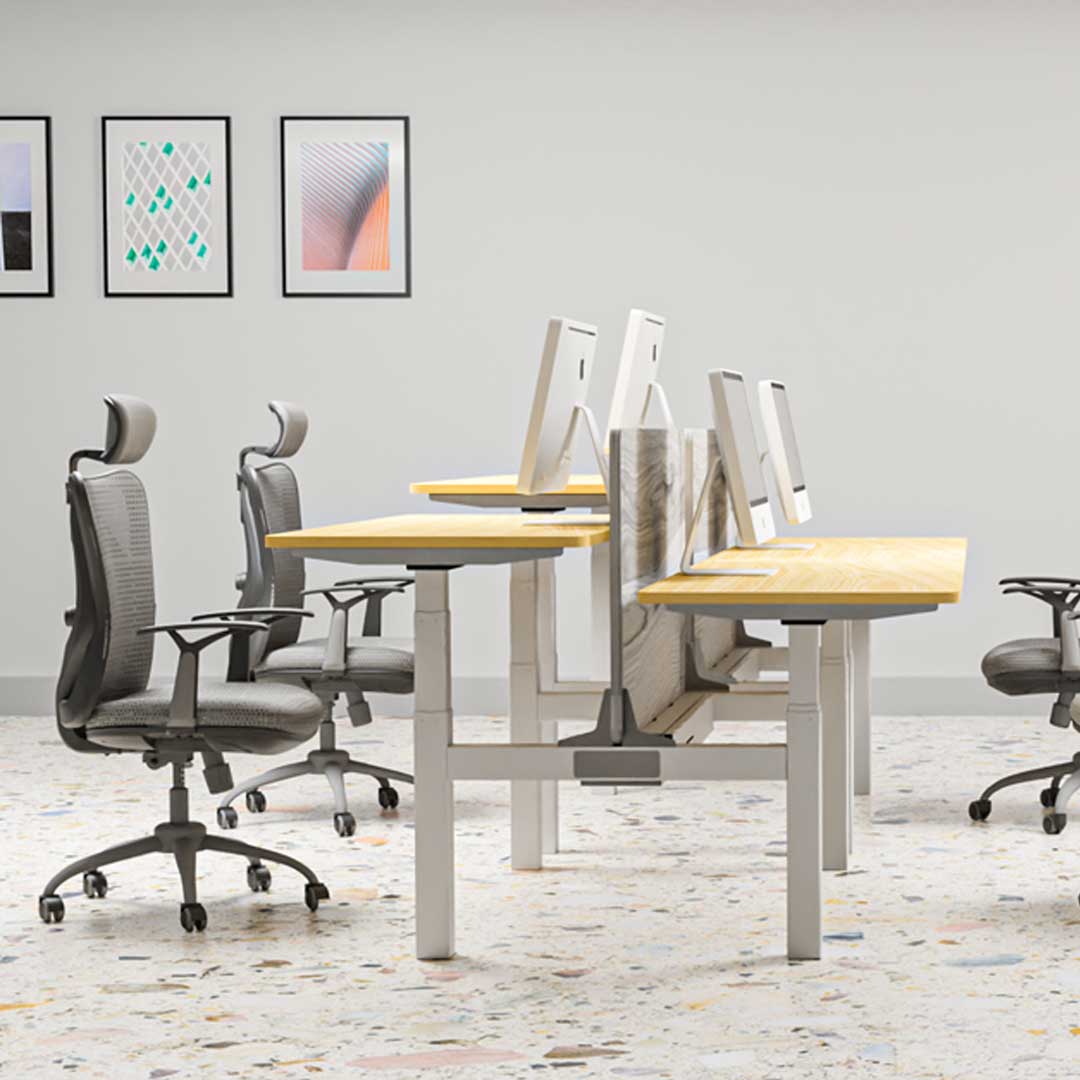In today’s fast-paced work environment, increasing productivity is a top priority for companies and individuals alike. One of the simplest and most effective changes to boost productivity is the introduction of a standing desk. A standing desk allows you to alternate between sitting and standing throughout the workday, providing a more dynamic and active workspace. While standing desks are often promoted for their health benefits, they also play a significant role in enhancing workplace productivity. In this article, we will explore the various ways a standing desk can help improve productivity at work, supported by scientific research and real-world experiences.
- Increases Energy and Reduces Fatigue
One of the most immediate and noticeable benefits of using a standing desk is the increase in energy levels. Sitting for long periods can lead to fatigue, lethargy, and decreased mental alertness. Standing, on the other hand, encourages blood circulation and increases oxygen flow to the brain, keeping you more energized and focused throughout the day.
A study published in the American Journal of Preventive Medicine found that employees who used standing desks reported less fatigue and more energy than their seated counterparts. This boost in energy can lead to better concentration, allowing you to work more efficiently and complete tasks with greater accuracy.
- Enhances Focus and Cognitive Function
Standing desks help to promote mental clarity and cognitive function. When you’re sitting for extended periods, especially in a slouched position, your body can become tense, and your brain may begin to feel sluggish. Standing desks combat this by encouraging movement, which stimulates the brain and helps maintain a higher level of focus.
Research from the Texas A&M Health Science Center found that employees who used standing desks were able to maintain better focus and concentration over longer periods. By breaking the monotony of sitting, standing desks help to prevent mental burnout, leading to more sustained attention on tasks and ultimately improving productivity.
- Reduces Back and Neck Pain
Chronic back and neck pain are among the most common complaints in sedentary office environments. Poor posture from prolonged sitting can lead to discomfort and even musculoskeletal disorders, which negatively impact productivity. Frequent discomfort from pain may cause employees to take more breaks or leave work earlier, resulting in lost time and lower efficiency.
Standing desks help alleviate these issues by promoting better posture and allowing employees to shift positions throughout the day. Studies have shown that standing desks can significantly reduce the incidence of back and neck pain. For instance, a study published in the Journal of Occupational and Environmental Medicine found that 87% of participants who used standing desks experienced less discomfort in the neck and upper back compared to those who worked seated all day. When employees are free from physical pain, they can stay focused on their work, leading to higher productivity levels.
- Promotes More Movement
Standing desks encourage physical activity throughout the workday, helping to counteract the sedentary lifestyle many office workers face. Even the simple act of standing and adjusting your posture periodically can make a significant difference in how alert and engaged you feel. More movement throughout the day leads to better circulation, higher energy levels, and improved cognitive function, all of which contribute to increased productivity.
Many users of standing desks incorporate small movements, such as shifting weight from one leg to another or using balance boards, to keep themselves engaged physically and mentally. Additionally, standing desks can encourage regular short walks around the office, which further breaks the monotony of sitting and helps refresh your mind for better task performance.
- Boosts Mood and Reduces Stress
Mental well-being plays a critical role in workplace productivity. Standing desks have been linked to improvements in mood and reductions in stress. A study published in the International Journal of Environmental Research and Public Health showed that employees who used standing desks reported lower levels of stress and fatigue than those who remained seated. Moreover, standing desk users reported feeling more active and engaged throughout their workday, which translated into improved performance and productivity.
The simple act of standing and having more freedom of movement can lead to the release of endorphins, the body’s natural mood enhancers. When employees feel more positive and less stressed, they are more likely to approach tasks with enthusiasm and stay productive for longer periods.
- Encourages Collaboration and Communication
Standing desks are often seen as more conducive to collaboration and communication in the workplace. When employees are standing, they are more likely to interact with colleagues and engage in quick discussions or brainstorming sessions. In contrast, sitting at a traditional desk can create a more isolated work environment where people are less inclined to move around or communicate.
Open office designs that incorporate standing desks encourage spontaneous communication and collaboration, leading to faster problem-solving and increased innovation. By fostering a more dynamic and interactive workspace, standing desks can help break down communication barriers and improve overall team productivity.
- Reduces Absenteeism
Frequent absenteeism is a major factor that negatively affects workplace productivity. Many employees take sick days or leave work early due to discomfort, fatigue, or health issues related to prolonged sitting. Standing desks can help reduce absenteeism by promoting better physical and mental health, which in turn leads to fewer sick days.
According to a report from the Centers for Disease Control and Prevention (CDC), standing desks have been shown to reduce the incidence of musculoskeletal problems and increase overall employee well-being. By improving health and reducing the risk of chronic conditions associated with sedentary behavior, standing desks help employees stay on the job and remain productive.
- Enhances Creativity
The freedom to move and stand during the workday can also boost creativity. Research has shown that physical movement stimulates the brain, leading to more creative thinking and problem-solving. A study conducted by Stanford University found that individuals who were given the opportunity to stand or walk during brainstorming sessions produced more creative ideas compared to those who were seated.
Standing desks give employees the flexibility to move and stretch while working, which can help spark new ideas and enhance creative thinking. In jobs that require innovation and out-of-the-box thinking, standing desks can be a valuable tool to inspire greater productivity and creativity.
Conclusion
The standing desk is a powerful tool not just for improving physical health, but also for boosting workplace productivity. By increasing energy levels, enhancing focus, reducing physical discomfort, and promoting better mood and collaboration, standing desks have the potential to revolutionize how we work. As more companies and individuals adopt standing desks, they will likely experience the productivity benefits that come with a more active and engaged work environment.
If you’re looking to improve your productivity at work, consider investing in a standing desk. It’s a simple change that can have a profound impact on your overall performance, health, and job satisfaction. Incorporating a standing desk into your daily routine might be the key to unlocking your full potential and achieving greater success in the workplace.
By making the switch to a standing desk, you’ll not only improve your work output but also contribute to a healthier, more dynamic work environment that supports long-term well-being and productivity.

